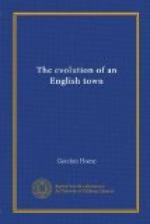“Sir John de Meaux claims to have housebote and hedgebote for himself, his men and tenants of Levisham in his woods of Levisham, in accordance with the assize of the forest, and reasonable estovers of turves in his demesnes of Levisham, for himself, his men and his tenants, and ironstone and a smelting-place in his woods of Levisham, paying to the Earl an annual rent of 2s and aeries of falcons, merlins and sparrow-hawk, and whatever honey is found in his woods at Levisham, and he claims to have a woodward in such woods. He is ready to prove that all these rights having been exercised by himself and his ancestors from ancient time, the housebote and hedgebote being appurtenant to his free tenement in Levisham, and brousewood and dry wood being taken to feed his furnaces. An inquiry is directed, and it is found that Sir John and his ancestors have from ancient time enjoyed the rights so claimed without interruption. Judgment is given in accordance with the verdict.”
“Ralph de Bulmer claims to have a free park at Thornton Riseborough, and to keep hounds to hunt there. He claims that King John by deed granted to one Alan de Winton, then holder of the park, and his heirs, liberty to inclose and make a free park, and to keep his hounds to hunt there; by virtue whereof Alan, whose estate he now holds, exercised the rights. He says that Edward II. inspected the grant of John, and granted to Ralph, that he and his heirs might hold the park with its appurtenances as Alan held it, without let or hindrance on the part of the King or his Justices, Escheators, Sheriffs, or other bailiffs, or officers whatsoever.
“Thomas de Pickering and Margaret, his wife, claim to have a woodward to keep their demesne wood at Lockton, and that no one may lop branches therein or fell any tree without their consent, and that they may fell and give away at pleasure green trees and dry, and give and sell dry trees at pleasure without view of the foresters.” In the following claim a mention is made of the “wildcat.” “Thomas Wake of Liddell claims to have a free chase for fox, hare, wildcat, and badger, within the boundaries of his barony of Middleton, namely, from the place called Alda on the Costa to the standing stone above the Spital Myre of Pickering, etc.”
“Hugh de Nevill is indicted, for that whilst he was bailiff of Pickering, under colour of his office, he arrested one Robert the Dyer, lately residing in Ebberston, bound his hands as if he were a felon, though he had not been indicted, and took from him a horse, harness, and other goods and chattels to the value of 20s. Afterwards he entrusted him to the care of his servant to take to York, but when they reached Malton, the servant let his prisoner escape.
“Henry de Rippley, sub-bailiff of Pickering, fined for having seized goods and chattels of Sir Robert de Scarborough, at Ebberston, for which he was indicted and found guilty on his own confession, 3s 4d.”




